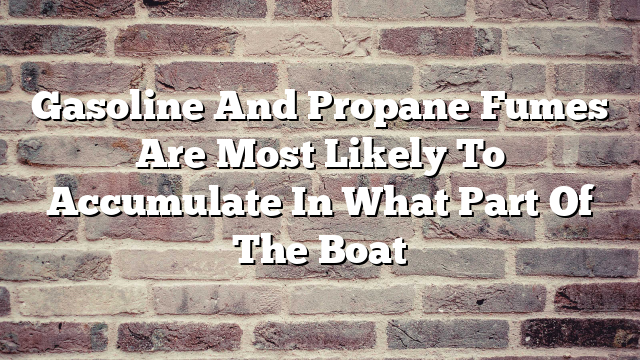Gasoline and propane fumes are essential components in powering boats and ensuring a smooth sailing experience. However, the accumulation of these fumes can pose significant risks to both the vessel and its occupants. Understanding where these fumes are most likely to accumulate is crucial for maintaining a safe and enjoyable boating experience. In this article, we will explore the specific areas of a boat where gasoline and propane fumes tend to gather, providing valuable insights for boat owners and enthusiasts alike.
As any seasoned boater knows, gasoline and propane are commonly used fuels for powering various boat engines and appliances. While these fuels provide the necessary energy for a boat to function, they also release potentially harmful fumes into the air. Identifying the areas where these fumes are most likely to accumulate is crucial for minimizing the associated risks and ensuring the well-being of everyone on board.
In this comprehensive guide, we will discuss the specific parts of a boat that are prone to fume accumulation, offering practical tips and insights to help boaters effectively manage this issue. By understanding these potential danger zones, boat owners can take proactive measures to prevent fume buildup, safeguard their vessel, and prioritize the safety of everyone aboard. So, let’s dive in and explore the key areas where gasoline and propane fumes tend to accumulate in boats, and discover how to mitigate these risks for a worry-free boating experience.
Gasoline and Propane Fumes: Where Do They Accumulate on a Boat?
When it comes to boating safety, understanding the potential risks associated with gasoline and propane fumes is crucial. These fumes can be hazardous if they accumulate in certain areas of the boat. By knowing where these fumes are most likely to gather, you can take the necessary precautions to keep yourself and others safe on the water.
1. Engine Compartment
The engine compartment is one of the primary areas where gasoline and propane fumes tend to accumulate on a boat. This enclosed space houses the boat’s engine and fuel system, making it a potential source of fume buildup. The fumes can be released from fuel lines, fuel tanks, or leaks in the engine itself.
To minimize the risk of fumes accumulating in the engine compartment, it is important to regularly inspect and maintain the fuel system. This includes checking for any signs of leaks, ensuring proper ventilation, and promptly addressing any issues that arise. Additionally, it is crucial to never operate the boat’s engine if you detect the smell of gasoline or propane in the compartment.
2. Bilge Area
The bilge area is another common location where gasoline and propane fumes may accumulate. This is the lowest part of the boat’s hull where water and other fluids collect. If there are any fuel leaks or spills, the fumes can make their way into the bilge area and linger there.
Regularly inspecting and cleaning the bilge area is key to preventing the buildup of fumes. Remove any oil, fuel, or other substances that may have accumulated, and ensure that the bilge pump is functioning properly. Proper ventilation is essential in this area as well, as it helps to dissipate any fumes that may be present.
3. Storage Compartments
Gasoline and propane fumes can also accumulate in storage compartments on a boat. These compartments are often used to store fuel containers, propane tanks, or other flammable substances. If these containers are not properly sealed or if there are any leaks, fumes can escape and build up within the compartments.
To prevent the accumulation of fumes in storage compartments, it is important to store fuel and propane containers in well-ventilated areas. Make sure all containers are tightly sealed and inspect them regularly for any signs of damage or leaks. If you detect the smell of gasoline or propane, remove the containers from the boat and address the issue immediately.
4. Cockpit Area
While less common, gasoline and propane fumes can also accumulate in the cockpit area of a boat. This area, where passengers and the boat operator typically spend their time, can be affected by fumes if there are any leaks or spills nearby.
To prevent the buildup of fumes in the cockpit area, it is important to address any fuel or propane leaks promptly. Regularly inspect the area for any signs of damage or spills, and ensure proper ventilation to keep the air circulating. If you detect any unusual odors, it is best to investigate and address the issue before continuing with boating activities.
5. Cabin or Living Spaces
In larger boats or yachts with enclosed cabins or living spaces, gasoline and propane fumes can also accumulate. These areas can become hazardous if there are fuel leaks, poorly ventilated fuel systems, or malfunctioning appliances such as stoves or heaters.
Regular inspection and maintenance of the fuel system, as well as proper ventilation in the cabin or living spaces, are crucial in preventing fume buildup. Ensure that all appliances are in good working condition and that there are no fuel leaks or spills in the area. Promptly address any issues to maintain a safe and comfortable environment on board.
6. Other Areas to Consider
In addition to the aforementioned areas, it is important to be aware that gasoline and propane fumes can potentially accumulate in other parts of the boat as well. These may include the fuel deck fill area, where fuel is added to the boat, or the fuel vent, where excess fumes are released.
Regular inspection, maintenance, and proper ventilation throughout the boat are essential to ensure that fumes do not accumulate in these less obvious areas. By being vigilant and proactive, you can mitigate the risks associated with gasoline and propane fumes on your boat.
Frequently Asked Questions
Here are some commonly asked questions about where gasoline and propane fumes are most likely to accumulate in a boat.
Question 1: Where are gasoline and propane fumes most likely to accumulate in a boat?
Gasoline and propane fumes are most likely to accumulate in the lower parts of the boat, particularly in the bilge area. The bilge is the lowest part of the boat where water and other fluids collect. Since gasoline and propane are heavier than air, they tend to sink and settle in the bilge.
It is important to regularly check the bilge for any fuel or propane leaks and ensure proper ventilation in this area to prevent the fumes from accumulating to dangerous levels. Failing to address these fumes can lead to a hazardous situation as they are highly flammable and can pose a risk of explosion or fire.
Question 2: Are there any other areas where gasoline and propane fumes may accumulate in a boat?
Yes, apart from the bilge, gasoline and propane fumes may also accumulate in other enclosed spaces of the boat such as storage compartments, engine compartments, and cabins. These areas can act as traps for the fumes, especially if there is inadequate ventilation.
It is crucial to regularly inspect these areas for any signs of fuel or propane leaks and ensure proper ventilation systems are in place. Additionally, it is recommended to install gas detectors or alarms in enclosed spaces to provide an early warning in case of any fume accumulation.
Question 3: How can I prevent gasoline and propane fumes from accumulating in my boat?
To prevent gasoline and propane fumes from accumulating in your boat, there are several measures you can take. Firstly, ensure that all fuel and propane systems are properly maintained and inspected regularly for any leaks. Any leaks should be promptly repaired to prevent fume accumulation.
Secondly, ensure there is adequate ventilation throughout the boat, especially in enclosed spaces. This can be achieved by installing ventilation systems, keeping windows and hatches open, and using exhaust fans. Proper ventilation helps to dissipate any fumes that may be present.
Question 4: What are the risks of gasoline and propane fume accumulation in a boat?
The risks of gasoline and propane fume accumulation in a boat are primarily related to their flammability. If these fumes reach a certain concentration and come into contact with an ignition source, they can ignite and cause a fire or explosion. This can result in serious injuries, damage to the boat, and even loss of life.
Furthermore, inhaling high concentrations of gasoline and propane fumes can also be harmful to human health. These fumes can cause respiratory issues, dizziness, nausea, and other adverse effects. It is important to address any fume accumulation promptly to minimize these risks.
Question 5: What should I do if I suspect gasoline or propane fumes have accumulated in my boat?
If you suspect gasoline or propane fumes have accumulated in your boat, it is important to take immediate action. Firstly, evacuate all occupants from the boat and move to a safe distance. Avoid any sources of ignition, such as turning on or off electrical equipment.
Once in a safe location, notify the appropriate authorities and seek professional assistance to address the fume accumulation. It is crucial not to re-enter the boat until it has been deemed safe by professionals. Safety should always be the top priority when dealing with potentially hazardous fumes.
In conclusion, understanding the potential risks associated with gasoline and propane fumes is crucial for any boat owner or enthusiast. While both fuels are essential for powering boats, it is important to be aware of where these fumes are most likely to accumulate. By identifying the specific areas where these fumes tend to gather, boat owners can take proactive steps to ensure the safety of themselves, their passengers, and their vessels.
One of the key areas where gasoline and propane fumes are most likely to accumulate is within the engine compartment. This is primarily due to the fact that the engine compartment houses the fuel tank, as well as the engine itself. As gasoline and propane are highly volatile substances, any leaks or spills in this area can lead to a dangerous build-up of fumes. It is therefore imperative to regularly inspect and maintain the engine compartment, ensuring that all fuel lines and connections are secure, and that any leaks are promptly addressed. Additionally, proper ventilation systems should be in place to effectively disperse any fumes that may accumulate within this area.
Another important area to be mindful of is the enclosed cabin or living space of the boat. While this area may not house the fuel sources directly, it can still be susceptible to fumes. This is particularly true if there are any leaks or faulty connections in the fuel lines that run through or near the cabin. Regularly checking these lines and ensuring they are in good condition is essential for preventing the accumulation of fumes in this area. Additionally, proper ventilation, such as opening windows or using exhaust fans, can help to dissipate any fumes that may find their way into the cabin.
In conclusion, by being aware of the areas where gasoline and propane fumes are most likely to accumulate on a boat, owners can take proactive measures to mitigate any potential risks. Regular maintenance, thorough inspections, and proper ventilation systems are all crucial components of ensuring the safety of all those on board. By prioritizing safety and remaining vigilant, boat owners can enjoy their time on the water with peace of mind.

















